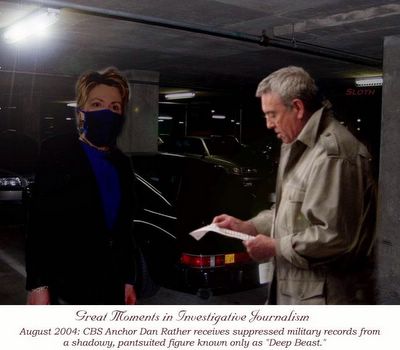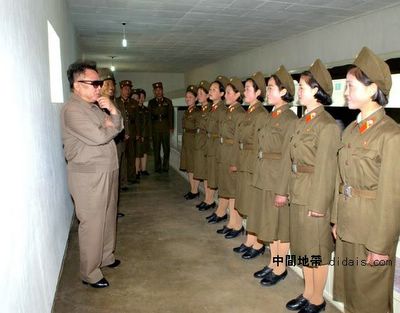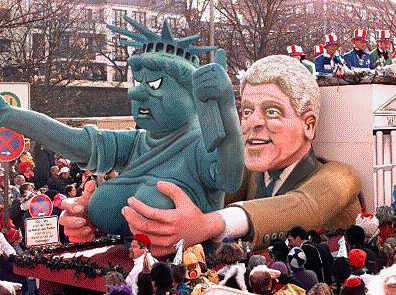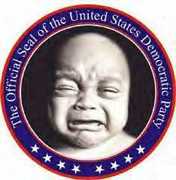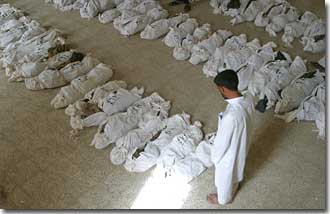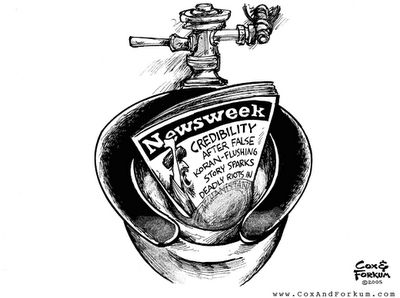WASHINGTON (AP) -- The Supreme Court on Tuesday upheld the constitutionality of a federal law requiring state prisons to accommodate inmate religions.
Justices unanimously sided with Ohio inmates, including a witch and a Satanist, who had claimed they were denied access to religious literature, ceremonial items and time to worship.
Justice Ruth Bader Ginsburg said the 2000 law, which was intended to protect the rights of prisoners, is not an unconstitutional government promotion of religion.
"It confers no privileged status on any particular religious sect, and singles out no bona fide faith for disadvantageous treatment," Ginsburg wrote.
The law requires states that receive federal money to accommodate prisoners' religious beliefs unless wardens can show that the accommodation would be disruptive.
Opponents of the law had argued that inmate requests for particular diets, special haircuts or religious symbols could make it harder to manage prisons.
"We do not read (the law) to elevate accommodation of religious observances over an institution's need to maintain order and safety," wrote Ginsburg. "We have no cause to believe that (the law) would not be applied in an appropriately balanced way, without sensitivity to security concerns."
Justices left open the door for a future challenge, on grounds that the law as applied overburdens prisons.
Tuesday's decision overturns a ruling by the Cincinnati-based 6th U.S. Circuit Court of Appeals, which had struck down part of the law, called the Religious Land Use and Institutionalized Persons Act, on grounds it violated the separation of church and state.
The Ohio case is Cutter v. Wilkinson, 03-9877.
2005年5月31日星期二
2005年5月30日星期一
400 copies of the Koran destroyed for one fake reported
Larry King aired a pre-taped interview with Vice President Dick Cheney on CNN this evening.
On one segment, Cheney said that during Hamid Karzai's state visit to Washington, the first repurcussions of the false Newsweek "Koran desecration" at Gitmo story were being acted out in various locations in Afghanistan.
Cheney quoted Karzai as having told him and President Bush that in Jalalabad in the northern part of his country, inflamed rioters attacked one of their own Afghan cultural centers and burned it to the ground.
Inside of the cultural center there had been over 400 especially fine copies of the Koran.
"They destroyed over 400 copies of the Koran," Cheney told Larry King, ".......all because of a false report that one copy of the Koran had been flushed down a toilet at Guantanamo."
Cheney then cracked his world famous wry, crooked smile and that segment ended!
On one segment, Cheney said that during Hamid Karzai's state visit to Washington, the first repurcussions of the false Newsweek "Koran desecration" at Gitmo story were being acted out in various locations in Afghanistan.
Cheney quoted Karzai as having told him and President Bush that in Jalalabad in the northern part of his country, inflamed rioters attacked one of their own Afghan cultural centers and burned it to the ground.
Inside of the cultural center there had been over 400 especially fine copies of the Koran.
"They destroyed over 400 copies of the Koran," Cheney told Larry King, ".......all because of a false report that one copy of the Koran had been flushed down a toilet at Guantanamo."
Cheney then cracked his world famous wry, crooked smile and that segment ended!
2005年5月29日星期日
2005年5月28日星期六
Ex-VP of CBS spoke out: Open Letter to Americans
Blaring from network and cable TV: ?Democrats forced the Senate to put off a final vote this week on John R. Bolton?s nomination to be U.N. ambassador, the latest setback for the tough-talking nominee President Bush has called "strong medicine for corruption and inefficiency at the United Nations.?
This was done by another filibuster that might delay the vote until June, thus shattering the myth that the two parties had joined together in a bond of trust that would end the obstruction that has kept Bush appointees from getting an up and down vote.
When is Bill Frist, the Senate Majority Leader and his fellow conservatives going to learn that the Democrats are no longer the party represented by Zell Miller? Remember that former President Ronald Reagan started off as not only a Democrat but also as the president of a labor union. He became a Republican because he believed his party had moved to the left, away from his personal and business philosophy. If President Reagan were alive today, he would be shocked to see how much more to the left the Democrat party has gone since he left office. He might even think of it as having become the new Socialist Party.
The Democrats are now street-smart and PR savvy. They know how easy it is to con many Republicans who still believe in one?s word of honor. They know how to create polls that will shape public opinion, and how to make a majority of Congress bow to the rule of the minority.
Not only has the Senate minority been able to limit the federal judge appointees to just three out of seven or more, they were even able to deceive Senator John McCain and his fellow moderate Republicans that they would end their use of the filibuster to delay, thus creating a new era of peace and trust.
The future Supreme Court, under President Bush, will have Congress decide whether it will be a Constitutional or a Legislative Court.
If the latter, our nation will become a secular and socialist nation; if the former, we will return to a country and culture envisioned by our founding fathers.
This will also depend on the makeup of our Congress in 2006 and the will of the American people. The anti-American culture and pro-socialist movement set in motion by Antonio Gramsci, the great Italian Socialist in the late 30s?, is now in full swing in America, having been allowed to slowly grow in power and influence over the past decades. Gramsci?s theory was that this would be the only way to take over America?his vision is now coming to fruition.
Our grandchildren will live in the country that we will leave them. And that country will be shaped by the next formation of the Supreme Court, whether it will be constitutional or legislative.
Do Americans have the courage to demand that their members of Congress vote for Constitutional judges, to put America?s interests above political ambition and to end the obstructionist tactics that are not letting our government solve the many problems that threaten our economy and security?
Do Americans also have the will to vote into Congress in 2006 those members who will put our nation?s culture and heritage above the desires of the secularists and socialists?
Only the near future will decide this. We now say to the American voters -in the words of the tennis buffs --- ?The ball is now in YOUR court!?
About the Writer: Lee Ellis is a retired journalist and a former vice president of both CBS and Gannet. He resides in Indio, California, where he write op-eds that appear in several local newspapers. Lee receives e-mail at.
This was done by another filibuster that might delay the vote until June, thus shattering the myth that the two parties had joined together in a bond of trust that would end the obstruction that has kept Bush appointees from getting an up and down vote.
When is Bill Frist, the Senate Majority Leader and his fellow conservatives going to learn that the Democrats are no longer the party represented by Zell Miller? Remember that former President Ronald Reagan started off as not only a Democrat but also as the president of a labor union. He became a Republican because he believed his party had moved to the left, away from his personal and business philosophy. If President Reagan were alive today, he would be shocked to see how much more to the left the Democrat party has gone since he left office. He might even think of it as having become the new Socialist Party.
The Democrats are now street-smart and PR savvy. They know how easy it is to con many Republicans who still believe in one?s word of honor. They know how to create polls that will shape public opinion, and how to make a majority of Congress bow to the rule of the minority.
Not only has the Senate minority been able to limit the federal judge appointees to just three out of seven or more, they were even able to deceive Senator John McCain and his fellow moderate Republicans that they would end their use of the filibuster to delay, thus creating a new era of peace and trust.
The future Supreme Court, under President Bush, will have Congress decide whether it will be a Constitutional or a Legislative Court.
If the latter, our nation will become a secular and socialist nation; if the former, we will return to a country and culture envisioned by our founding fathers.
This will also depend on the makeup of our Congress in 2006 and the will of the American people. The anti-American culture and pro-socialist movement set in motion by Antonio Gramsci, the great Italian Socialist in the late 30s?, is now in full swing in America, having been allowed to slowly grow in power and influence over the past decades. Gramsci?s theory was that this would be the only way to take over America?his vision is now coming to fruition.
Our grandchildren will live in the country that we will leave them. And that country will be shaped by the next formation of the Supreme Court, whether it will be constitutional or legislative.
Do Americans have the courage to demand that their members of Congress vote for Constitutional judges, to put America?s interests above political ambition and to end the obstructionist tactics that are not letting our government solve the many problems that threaten our economy and security?
Do Americans also have the will to vote into Congress in 2006 those members who will put our nation?s culture and heritage above the desires of the secularists and socialists?
Only the near future will decide this. We now say to the American voters -in the words of the tennis buffs --- ?The ball is now in YOUR court!?
About the Writer: Lee Ellis is a retired journalist and a former vice president of both CBS and Gannet. He resides in Indio, California, where he write op-eds that appear in several local newspapers. Lee receives e-mail at
2005年5月27日星期五
2005年5月26日星期四
2005年5月24日星期二
Former PM Reveals Secrets on Birth of Al-Qaeda in Iraq
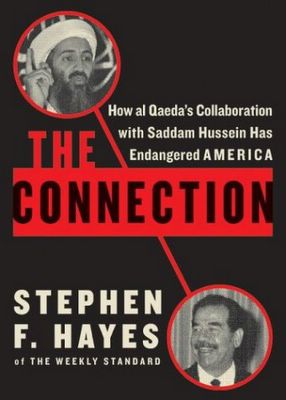
Baghdad, 23 May - The number two of the al-Qaeda network, Ayman al-Zawahiri, visited Iraq under a false name in September 1999 to take part in the ninth Popular Islamic Congress, former Iraqi premier Iyad Allawi has revealed to pan-Arab daily al-Hayat. In an interview, Allawi made public information discovered by the Iraqi secret service in the archives of the Saddam Hussein regime, which sheds light on the relationship between Saddam Hussein and the Islamic terrorist network. He also said that both al-Zawahiri and Jordanian militant al-Zarqawi probably entered Iraq in the same period.
"Al-Zawahiri was summoned by Izza Ibrahim Al-Douri ? then deputy head of the council of the leadership of the revolution - to take part in the congress, along with some 150 other Islamic figures from 50 Muslim countries," Allawi said.
According to Allawi, important information has been gathered regarding the presence of another key terrorist figure operating in Iraq - the Jordanian militant Abu Musab al-Zarqawi.
Allawi's remarks come after statements to al-Hayat by King Abdallah II of Jordan over Saddam's refusal to hand over al-Zarqawi to the authorities in Amman.
On this question Allawi said: ''The words of the Jordanian King are correct and important. We have proof of al-Zawahiri's visit to Iraq, but we do not have the precise date or information on al-Zarqawi's entry
In Allawi's view, Saddam's government "sponsored" the birth of al-Qaeda in Iraq, coordinating with other terrorist groups, both Arab and Muslim. "The Iraqi secret services had links to these groups through a person called Faruq Hajizi, later named Iraq's ambassador to Turkey and arrested after the fall of Saddam's regime as he tried to re-enter Iraq. Iraqi secret agents helped terrorists enter the country and directed them to the Ansar al-Islam camps in the Halbija area," he said.
2005年5月23日星期一
CNN anchor Riz Khan joins forces with Al Jazeera
MUMBAI: Former CNN International anchor Riz Khan has joined the upcoming news network Al jazeera International. He will host an interactive interview show. When he was at CNN Khan hosted the show Q&A which was also interactive in nature. Al Jazeera International a 24-hour, English-language news and current affairs channel is set to broadcast globally from next year.
Khan’s new show, live daily from Washington DC, will feature world leaders, newsmakers and celebrities in a question and answer format led by viewer participation. Speaking about the upcoming channel Al Jazeera International MD Nigel Parson said, "This is the most exciting television news and current affairs project in decades. It will revolutionise the global news industry by offering viewers across the world a fresh perspective on news."
Khan’s show ? aimed at being the world’s most interactive interview programme ? will allow viewers to directly talk to newsmakers with their questions. Khan says, "I think we are at a turning point where viewers across the world are looking for a fresh approach to news and information. Al Jazeera brings together all the pieces to provide a complete picture on global issues. I’m incredibly excited to have this rare chance to build something so new and influential from the ground up.
"Al Jazeera International is all about revolutionising viewer choice. I’ve now got the chance to offer viewers around the globe a much-needed voice on the world stage. Imagine, a person at any level in society, in almost any country, having the chance to talk directly with a President or a Prime Minister, or even a global celebrity. It’s a wonderfully honest and equal opportunity for people ? something still uncommon in broadcasting."
Khan’s new show, live daily from Washington DC, will feature world leaders, newsmakers and celebrities in a question and answer format led by viewer participation. Speaking about the upcoming channel Al Jazeera International MD Nigel Parson said, "This is the most exciting television news and current affairs project in decades. It will revolutionise the global news industry by offering viewers across the world a fresh perspective on news."
Khan’s show ? aimed at being the world’s most interactive interview programme ? will allow viewers to directly talk to newsmakers with their questions. Khan says, "I think we are at a turning point where viewers across the world are looking for a fresh approach to news and information. Al Jazeera brings together all the pieces to provide a complete picture on global issues. I’m incredibly excited to have this rare chance to build something so new and influential from the ground up.
"Al Jazeera International is all about revolutionising viewer choice. I’ve now got the chance to offer viewers around the globe a much-needed voice on the world stage. Imagine, a person at any level in society, in almost any country, having the chance to talk directly with a President or a Prime Minister, or even a global celebrity. It’s a wonderfully honest and equal opportunity for people ? something still uncommon in broadcasting."
2005年5月22日星期日
2005年5月21日星期六
2005年5月20日星期五
Hamza Adnan, 8, Jinan Jassim, Ayah Faiz, 5, and Duha Munaf, 16, from left, watch Dubai-based satellite television station al-Arabiya in a house in the Karada area of Baghdad, Friday May 20, 2005, as it broadcasts Friday's front page of Britain's mass circulation tabloid newspaper, the Sun, showing Saddam Hussein standing in his white underwear while folding what appears to be a brown pair of trousers. (AP Photo/Hadi Mizban)
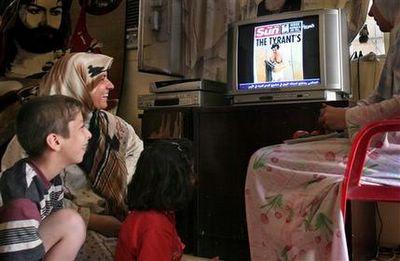

2005年5月19日星期四
America Basher: PepsiCo's President & CFO, Indra Nooyi
Indra Nooyi, President and CFO, PepsiCo
May 15, 2005
---Snip ----
This analogy of the five fingers as the five major continents leaves the long, middle finger for North America, and, in particular, The United States. As the longest of the fingers, it really stands out. The middle finger anchors every function that the hand performs and is the key to all of the fingers working together efficiently and effectively. This is a really good thing, and has given the U.S. a leg-up in global business since the end of World War I.
However, if used inappropriately ?just like the U.S. itself -- the middle finger can convey a negative message and get us in trouble. You know what I’m talking about. In fact, I suspect you’re hoping that I’ll demonstrate what I mean. And trust me, I’m not looking for volunteers to model.
Discretion being the better part of valor … I think I’ll pass.
What is most crucial to my analogy of the five fingers as the five major continents, is that each of us in the U.S. ? the long middle finger ? must be careful that when we extend our arm in either a business or political sense, we take pains to assure we are giving a hand … not the finger. Sometimes this is very difficult. Because the U.S. ? the middle finger ? sticks out so much, we can send the wrong message unintentionally.
***Unfortunately, I think this is how the rest of the world looks at the U.S. right now. Not as part of the hand ? giving strength and purpose to the rest of the fingers ? but, instead, scratching our nose and sending a far different signal.***
A U.S. businesswoman was recently in Beijing, China, on an international training assignment for a luxury hotel chain. The chain was rebranding an older Beijing hotel. As such, the toilets in the hotel had yet to be upgraded. There were no porcelain commodes, just holes in the floor. Until recently, this was the standard procedure in China.
Now, eight-thousand-miles removed from the scene, you and I ? and most Americans ? can shake our heads and giggle at the physical contortions and delicate motor skills necessary to make the best of this situation. We’re simply not used to it. But to loudly and insultingly verbalize these feelings on site ? in front of the employees and guests of the host country is bush league. And, yet, that’s exactly what this woman observed.
In the hotel’s bar, the woman overheard a group of five American businessmen loudly making fun of the hotel’s lavatory facilities. As the drinks flowed, the crass and vulgar comments grew louder, and actually took on an angry, jingoistic tone.
While these Americans couldn’t speak a word of Chinese, their Chinese hosts spoke English very well … and understood every word the men were saying. And we wonder why the world views many Americans as boorish and culturally insensitive. This incident should make it abundantly clear. These men were not giving China a hand. They were giving China the finger.
This finger was red, white and blue and had “the United States” stamped all over it. Graduates, it pains me greatly that this view of America persists.
May 15, 2005
---Snip ----
This analogy of the five fingers as the five major continents leaves the long, middle finger for North America, and, in particular, The United States. As the longest of the fingers, it really stands out. The middle finger anchors every function that the hand performs and is the key to all of the fingers working together efficiently and effectively. This is a really good thing, and has given the U.S. a leg-up in global business since the end of World War I.
However, if used inappropriately ?just like the U.S. itself -- the middle finger can convey a negative message and get us in trouble. You know what I’m talking about. In fact, I suspect you’re hoping that I’ll demonstrate what I mean. And trust me, I’m not looking for volunteers to model.
Discretion being the better part of valor … I think I’ll pass.
What is most crucial to my analogy of the five fingers as the five major continents, is that each of us in the U.S. ? the long middle finger ? must be careful that when we extend our arm in either a business or political sense, we take pains to assure we are giving a hand … not the finger. Sometimes this is very difficult. Because the U.S. ? the middle finger ? sticks out so much, we can send the wrong message unintentionally.
***Unfortunately, I think this is how the rest of the world looks at the U.S. right now. Not as part of the hand ? giving strength and purpose to the rest of the fingers ? but, instead, scratching our nose and sending a far different signal.***
A U.S. businesswoman was recently in Beijing, China, on an international training assignment for a luxury hotel chain. The chain was rebranding an older Beijing hotel. As such, the toilets in the hotel had yet to be upgraded. There were no porcelain commodes, just holes in the floor. Until recently, this was the standard procedure in China.
Now, eight-thousand-miles removed from the scene, you and I ? and most Americans ? can shake our heads and giggle at the physical contortions and delicate motor skills necessary to make the best of this situation. We’re simply not used to it. But to loudly and insultingly verbalize these feelings on site ? in front of the employees and guests of the host country is bush league. And, yet, that’s exactly what this woman observed.
In the hotel’s bar, the woman overheard a group of five American businessmen loudly making fun of the hotel’s lavatory facilities. As the drinks flowed, the crass and vulgar comments grew louder, and actually took on an angry, jingoistic tone.
While these Americans couldn’t speak a word of Chinese, their Chinese hosts spoke English very well … and understood every word the men were saying. And we wonder why the world views many Americans as boorish and culturally insensitive. This incident should make it abundantly clear. These men were not giving China a hand. They were giving China the finger.
This finger was red, white and blue and had “the United States” stamped all over it. Graduates, it pains me greatly that this view of America persists.
2005年5月17日星期二
Useful idiots in New York Time saddened
A Clampdown in China
E-Mail This
Printer-Friendly
By NICHOLAS D. KRISTOF
Published: May 17, 2005
BEIJING
The most important person in the world right now may be Hu Jintao, and we're beginning to get a better sense of what kind of a leader he is: disappointing.
More than anyone else, President Hu will determine whether China can continue to surge and whether its rise will be stable and peaceful. Ever since he vaulted into the top ranks of the Communist Party in 1992, there have been vigorous debates about whether he is a closet reformer or a closet hard-liner, but now that he has been the Communist leader for two and a half years, we can form a tentative conclusion: the second camp seems to have been right.
Mr. Hu appears to be an intuitive authoritarian who believes in augmenting the tools of repression, not easing them. Most distressing, Mr. Hu has tugged China backward politically. He has presided over a steady crackdown on dissent, the news media, religion, Internet commentary and think tanks. China now imprisons far more journalists than any other country.
At The New York Times, we've seen this crackdown firsthand. Zhao Yan, a colleague who works for the Times bureau in Beijing, was seized last September and tossed into prison. Why? We don't know for sure, because Mr. Zhao has never been tried and neither his lawyer nor his family members have even been allowed to see him.
Likewise, the bravest and boldest Chinese newspaper used to be Nanfang Dushi Bao. But then the paper reported that the police had beaten a university student to death because he wasn't carrying his ID. Two staff members were sent to prison last year for long terms, and China's newspapers are now more docile.
Mr. Hu also has a knack for using old-style propaganda phrases that make him sound like a time capsule from a more Communist past. And Chinese intellectuals were horrified when Mr. Hu issued an internal statement saying that while North Korea had made economic mistakes, it had the right ideas politically.
Still, Mr. Hu's clampdown has had only a limited effect, because China is now too porous and complex for anybody to control very successfully. Ordinary people are hiring lawyers to enforce their rights, and the rule of law is steadily painting the party leaders into a corner.
"They can't control everything any more," said a Chinese with long connections to the country's leaders. "They're like a fire brigade, rushing around to put out the fires that burn hottest, and leaving the others alone."
In any case, while Mr. Hu is a big disappointment in his political vision, he is turning out to be more solid in other areas, like foreign policy. Mr. Hu has done a good job managing foreign relations with other countries, aside from Japan and Sudan, and he has engaged North Korea more meaningfully on the nuclear issue than his predecessors did. Mr. Hu has at least managed to work out a coherent policy toward North Korea, which the Bush administration has yet to do.
Mr. Hu's economic instincts run to central planning, but he is also pragmatic. And he has a personal stake in a capitalist future: his only daughter, Hu Haiqing, has experience in the high-tech business world and is married to a Stanford-educated Internet tycoon, Daniel Mao.
Perhaps Mr. Hu's most important step has been to begin to address rural poverty and environmental problems, rather than focusing solely on economic growth and new market reforms to achieve it. This shift to more balanced growth is smart and long overdue.
At the same time, the pace of economic reform has also stalled, and the giddy expectation that major new reforms are on the way has gone. If this pause is a chance for China to catch its breath, that would be fine - but it looks like more than that.
Mr. Hu's basic problem is that he is trying to achieve stability by keeping the lid sealed tight on the pressure cooker. But the lesson of Taiwan and South Korea is the need to expand freedoms to provide outlets for those pressures. Otherwise, as Ukraine and Indonesia showed, pressure cookers can explode.
So Mr. Hu's emphasis on short-term stability may ultimately be increasing the risks of major instability in China down the road. And in that sense, the victims of Mr. Hu's crackdown are not just the individuals sitting in jail, but the entire Chinese people.

E-Mail This
Printer-Friendly
By NICHOLAS D. KRISTOF
Published: May 17, 2005
BEIJING
The most important person in the world right now may be Hu Jintao, and we're beginning to get a better sense of what kind of a leader he is: disappointing.
More than anyone else, President Hu will determine whether China can continue to surge and whether its rise will be stable and peaceful. Ever since he vaulted into the top ranks of the Communist Party in 1992, there have been vigorous debates about whether he is a closet reformer or a closet hard-liner, but now that he has been the Communist leader for two and a half years, we can form a tentative conclusion: the second camp seems to have been right.
Mr. Hu appears to be an intuitive authoritarian who believes in augmenting the tools of repression, not easing them. Most distressing, Mr. Hu has tugged China backward politically. He has presided over a steady crackdown on dissent, the news media, religion, Internet commentary and think tanks. China now imprisons far more journalists than any other country.
At The New York Times, we've seen this crackdown firsthand. Zhao Yan, a colleague who works for the Times bureau in Beijing, was seized last September and tossed into prison. Why? We don't know for sure, because Mr. Zhao has never been tried and neither his lawyer nor his family members have even been allowed to see him.
Likewise, the bravest and boldest Chinese newspaper used to be Nanfang Dushi Bao. But then the paper reported that the police had beaten a university student to death because he wasn't carrying his ID. Two staff members were sent to prison last year for long terms, and China's newspapers are now more docile.
Mr. Hu also has a knack for using old-style propaganda phrases that make him sound like a time capsule from a more Communist past. And Chinese intellectuals were horrified when Mr. Hu issued an internal statement saying that while North Korea had made economic mistakes, it had the right ideas politically.
Still, Mr. Hu's clampdown has had only a limited effect, because China is now too porous and complex for anybody to control very successfully. Ordinary people are hiring lawyers to enforce their rights, and the rule of law is steadily painting the party leaders into a corner.
"They can't control everything any more," said a Chinese with long connections to the country's leaders. "They're like a fire brigade, rushing around to put out the fires that burn hottest, and leaving the others alone."
In any case, while Mr. Hu is a big disappointment in his political vision, he is turning out to be more solid in other areas, like foreign policy. Mr. Hu has done a good job managing foreign relations with other countries, aside from Japan and Sudan, and he has engaged North Korea more meaningfully on the nuclear issue than his predecessors did. Mr. Hu has at least managed to work out a coherent policy toward North Korea, which the Bush administration has yet to do.
Mr. Hu's economic instincts run to central planning, but he is also pragmatic. And he has a personal stake in a capitalist future: his only daughter, Hu Haiqing, has experience in the high-tech business world and is married to a Stanford-educated Internet tycoon, Daniel Mao.
Perhaps Mr. Hu's most important step has been to begin to address rural poverty and environmental problems, rather than focusing solely on economic growth and new market reforms to achieve it. This shift to more balanced growth is smart and long overdue.
At the same time, the pace of economic reform has also stalled, and the giddy expectation that major new reforms are on the way has gone. If this pause is a chance for China to catch its breath, that would be fine - but it looks like more than that.
Mr. Hu's basic problem is that he is trying to achieve stability by keeping the lid sealed tight on the pressure cooker. But the lesson of Taiwan and South Korea is the need to expand freedoms to provide outlets for those pressures. Otherwise, as Ukraine and Indonesia showed, pressure cookers can explode.
So Mr. Hu's emphasis on short-term stability may ultimately be increasing the risks of major instability in China down the road. And in that sense, the victims of Mr. Hu's crackdown are not just the individuals sitting in jail, but the entire Chinese people.

2005年5月16日星期一
2005年5月13日星期五
Poverty, American Style: Cars, TVs, Three-Bedroom Homes
Last month, to much media pooplah, the Census Bureau released its annual report on poverty in the U.S. Predictably, liberals all but wailed about bread lines and soup kitchens. Democratic Sen. Joe Lieberman of Connecticut called the poverty figures "a national scandal." But the report contained relatively good news, as recessions go.
As expected, the Census numbers showed poverty had increased in 2002 due to the economic downturn; however, the poverty rise was quite modest when compared to prior recessions. For example, the report showed that during the first two years of the current downturn the number of poor children increased by 550,000 or one half of 1% of all children. By contrast, in each of the previous three recessions (back to the early 1970s) child poverty increased, on average, by two and a half percentage points over the same period?or five times as much. In its impact on poverty, the economic slowdown from which we are now emerging was one of the mildest on record.
But what is more remarkable is the story behind the Census figures: The actual living conditions of the individuals the government deems to be poor. For most Americans the word "poverty" suggests destitution: an inability to provide a family with nutritious food, clothing and reasonable shelter. But only a small number of the 35 million persons classified as "poor" by the Census Bureau fit that description.
While real material hardship certainly does occur, it is limited in scope and severity. The bulk of the "poor" live in material conditions that would have been judged as comfortable or well-off just a few generations ago. Today, the expenditures per person of the lowest income one-fifth (or quintile) of households equal those of the median American household in the early 1970s, after adjusting for inflation.
Microwaves and Stereos
The following are facts about persons defined as "poor" by the Census Bureau, taken from various government reports:
Forty-six per cent of all poor households actually own their own homes. The average home owned by persons classified as poor by the Census Bureau is a three-bedroom house with one and a half baths, a garage and porch or patio.
Seventy-six per cent of poor households have air conditioning. By contrast, 30 years ago only 36% of the entire U.S. population enjoyed air conditioning.
Only 6% of poor households are overcrowded. More than two thirds have more than two rooms per person.
The average poor American has more living space than the average individual living in Paris, London, Vienna, Athens and other cities throughout Europe. (Note: These comparisons are to the average citizens in foreign countries not to those classified as poor.)
Nearly three-quarters of poor households own a car; 30% own two or more cars.
Ninety-seven percent of poor households have a color television. Over half own two or more color televisions. Seventy-eight percent have a VCR or DVD player. Sixty-two percent have cable or satellite TV reception.
Seventy-three percent own microwave ovens; more than half have a stereo, and a third have an automatic dishwasher.
As a group the poor are far from being chronically undernourished. The average consumption of protein, vitamins and minerals is virtually the same for poor and middle-class children, and in most cases is well above recommended norms. Poor children actually consume more meat than do higher-income children and have average protein intakes 100% above recommended levels. Most poor children today are in fact super-nourished, on average growing up to be one inch taller and ten pounds heavier than the GIs who stormed the beaches of Normandy in World War II.
While the poor are generally well nourished, some poor families do experience hunger, meaning a temporary discomfort due to food shortages. According to the U.S. Department of Agriculture, 13% of poor families and 2.6% of poor children experience hunger at some point during the year. In most cases their hunger is short-term. Overall, 84% of the poor report their families have "enough" food to eat, while only 3% say they "often" do not have enough to eat.
Overall, the typical American, defined as poor by the government, has a car, air conditioning, a refrigerator, stove, clothes washer and dryer and a microwave. He has two color televisions, cable or satellite TV reception, a VCR or DVD player and a stereo. He is able to obtain medical care. His home is in good repair and is not over-crowded.
By his own report, his family is not hungry and in the last year he had sufficient funds to meet his family’s essential needs. While this individual’s life is not opulent, it is equally far from the popular images of dire poverty conveyed by the press, liberal activists and politicians.
Still, "poverty", even as defined by the broad standards of the Census Bureau, can be reduced further, particularly among children. There are two main reasons American children are poor: Their parents don’t work much, and fathers are absent from the home. In good economic times or bad, the typical poor family with children is supported by only 800 hours of work during a year?that amounts to 16 hours of work per week. If work in each family were raised to 2,000 hours per year?the equivalent of one adult working 40 hours per week through the year?nearly 75% of poor children would be lifted out of official poverty.
Not having a dad around is another reliable pathway down into poverty. Nearly two-thirds of poor children reside in single-parent homes. Each year an additional 1.3 million children are born out-of-wedlock. If poor mothers married the fathers of their children, almost three quarters would immediately be lifted out of poverty.
While work and marriage are steady ladders out of poverty, the welfare system perversely remains hostile to both. Major programs such as Food Stamps, public housing, and Medicaid continue to reward idleness and penalize marriage. If welfare could be turned around to encourage work and marriage, remaining poverty would drop quickly.
Still, in a sense, the poor will always be with us. The liberal grievance industry needs an abundant supply of apparent victims to keep its motors running. Without a permanent victim class, liberals cannot survive. Thus, in liberal imagination and rhetoric, the microwave must always be bare.
As expected, the Census numbers showed poverty had increased in 2002 due to the economic downturn; however, the poverty rise was quite modest when compared to prior recessions. For example, the report showed that during the first two years of the current downturn the number of poor children increased by 550,000 or one half of 1% of all children. By contrast, in each of the previous three recessions (back to the early 1970s) child poverty increased, on average, by two and a half percentage points over the same period?or five times as much. In its impact on poverty, the economic slowdown from which we are now emerging was one of the mildest on record.
But what is more remarkable is the story behind the Census figures: The actual living conditions of the individuals the government deems to be poor. For most Americans the word "poverty" suggests destitution: an inability to provide a family with nutritious food, clothing and reasonable shelter. But only a small number of the 35 million persons classified as "poor" by the Census Bureau fit that description.
While real material hardship certainly does occur, it is limited in scope and severity. The bulk of the "poor" live in material conditions that would have been judged as comfortable or well-off just a few generations ago. Today, the expenditures per person of the lowest income one-fifth (or quintile) of households equal those of the median American household in the early 1970s, after adjusting for inflation.
Microwaves and Stereos
The following are facts about persons defined as "poor" by the Census Bureau, taken from various government reports:
Forty-six per cent of all poor households actually own their own homes. The average home owned by persons classified as poor by the Census Bureau is a three-bedroom house with one and a half baths, a garage and porch or patio.
Seventy-six per cent of poor households have air conditioning. By contrast, 30 years ago only 36% of the entire U.S. population enjoyed air conditioning.
Only 6% of poor households are overcrowded. More than two thirds have more than two rooms per person.
The average poor American has more living space than the average individual living in Paris, London, Vienna, Athens and other cities throughout Europe. (Note: These comparisons are to the average citizens in foreign countries not to those classified as poor.)
Nearly three-quarters of poor households own a car; 30% own two or more cars.
Ninety-seven percent of poor households have a color television. Over half own two or more color televisions. Seventy-eight percent have a VCR or DVD player. Sixty-two percent have cable or satellite TV reception.
Seventy-three percent own microwave ovens; more than half have a stereo, and a third have an automatic dishwasher.
As a group the poor are far from being chronically undernourished. The average consumption of protein, vitamins and minerals is virtually the same for poor and middle-class children, and in most cases is well above recommended norms. Poor children actually consume more meat than do higher-income children and have average protein intakes 100% above recommended levels. Most poor children today are in fact super-nourished, on average growing up to be one inch taller and ten pounds heavier than the GIs who stormed the beaches of Normandy in World War II.
While the poor are generally well nourished, some poor families do experience hunger, meaning a temporary discomfort due to food shortages. According to the U.S. Department of Agriculture, 13% of poor families and 2.6% of poor children experience hunger at some point during the year. In most cases their hunger is short-term. Overall, 84% of the poor report their families have "enough" food to eat, while only 3% say they "often" do not have enough to eat.
Overall, the typical American, defined as poor by the government, has a car, air conditioning, a refrigerator, stove, clothes washer and dryer and a microwave. He has two color televisions, cable or satellite TV reception, a VCR or DVD player and a stereo. He is able to obtain medical care. His home is in good repair and is not over-crowded.
By his own report, his family is not hungry and in the last year he had sufficient funds to meet his family’s essential needs. While this individual’s life is not opulent, it is equally far from the popular images of dire poverty conveyed by the press, liberal activists and politicians.
Still, "poverty", even as defined by the broad standards of the Census Bureau, can be reduced further, particularly among children. There are two main reasons American children are poor: Their parents don’t work much, and fathers are absent from the home. In good economic times or bad, the typical poor family with children is supported by only 800 hours of work during a year?that amounts to 16 hours of work per week. If work in each family were raised to 2,000 hours per year?the equivalent of one adult working 40 hours per week through the year?nearly 75% of poor children would be lifted out of official poverty.
Not having a dad around is another reliable pathway down into poverty. Nearly two-thirds of poor children reside in single-parent homes. Each year an additional 1.3 million children are born out-of-wedlock. If poor mothers married the fathers of their children, almost three quarters would immediately be lifted out of poverty.
While work and marriage are steady ladders out of poverty, the welfare system perversely remains hostile to both. Major programs such as Food Stamps, public housing, and Medicaid continue to reward idleness and penalize marriage. If welfare could be turned around to encourage work and marriage, remaining poverty would drop quickly.
Still, in a sense, the poor will always be with us. The liberal grievance industry needs an abundant supply of apparent victims to keep its motors running. Without a permanent victim class, liberals cannot survive. Thus, in liberal imagination and rhetoric, the microwave must always be bare.
2005年5月12日星期四
KEN STARR'S REAL VIEWS (SeeBS lying again)
Posted on 05/12/2005 1:45:25 PM EDT by Pikamax
KEN STARR'S REAL VIEWS [Ramesh Ponnuru]
CBS, AP, and other outlets reported earlier this week that Starr had said that getting rid of the judicial filibuster would be a "radical, radical departure from our history and our traditions, and it amounts to an assault on the judicial branch of government."
This seemed like a very odd thing for Starr to say, so I contacted him.
He forwarded to me an email he had sent to someone else who had asked about this matter:
"In the piece that I have now seen, and which I gather is being lavishly quoted, CBS employed two snippets. The 'radical departure' snippet was specifically addressed -- although this is not evidenced whatever from the clip -- to the practice of invoking judicial philosopy as a grounds for voting against a qualified nominee of integrity and experience. I said in sharp language that that practice was wrong. I contrasted the current practice . . . with what occurred during Ruth Ginsburg's nomination process, as numerous Republicans voted (rightly) to confirm a former ACLU staff lawyer. They disagreed with her positions as a lawyer, but they voted (again, rightly) to confirm her. Why? Because elections, like ideas, have consequences. . . . In the interview, I did indeed suggest, and have suggested elsewhere, that caution and prudence be exercised (Burkean that I am) in shifting/modifying rules (that's the second snippet), but I likewise made clear that the 'filibuster' represents an entirely new use (and misuse) of a venerable tradition. . . .
"[O]ur friends are way off base in assuming that the CBS snippets, as used, represent (a) my views, or (b) what I in fact said."
KEN STARR'S REAL VIEWS [Ramesh Ponnuru]
CBS, AP, and other outlets reported earlier this week that Starr had said that getting rid of the judicial filibuster would be a "radical, radical departure from our history and our traditions, and it amounts to an assault on the judicial branch of government."
This seemed like a very odd thing for Starr to say, so I contacted him.
He forwarded to me an email he had sent to someone else who had asked about this matter:
"In the piece that I have now seen, and which I gather is being lavishly quoted, CBS employed two snippets. The 'radical departure' snippet was specifically addressed -- although this is not evidenced whatever from the clip -- to the practice of invoking judicial philosopy as a grounds for voting against a qualified nominee of integrity and experience. I said in sharp language that that practice was wrong. I contrasted the current practice . . . with what occurred during Ruth Ginsburg's nomination process, as numerous Republicans voted (rightly) to confirm a former ACLU staff lawyer. They disagreed with her positions as a lawyer, but they voted (again, rightly) to confirm her. Why? Because elections, like ideas, have consequences. . . . In the interview, I did indeed suggest, and have suggested elsewhere, that caution and prudence be exercised (Burkean that I am) in shifting/modifying rules (that's the second snippet), but I likewise made clear that the 'filibuster' represents an entirely new use (and misuse) of a venerable tradition. . . .
"[O]ur friends are way off base in assuming that the CBS snippets, as used, represent (a) my views, or (b) what I in fact said."
2005年5月7日星期六
Tape of Hillary Aide Reveals Sex, Drugs
Audiotapes recorded by Kennedy in-law Raymond Reggie while cooperating with an FBI probe into an August 2000 gala fund-raiser for Hillary Clinton could be devastating for the Democratic Party, according to Louisiana's Times Picayune, which has obtained transcripts of the Reggie tapes.
The paper reports that a Sept. 4, 2002 tape of Reggie talking to Hillary Clinton's 2000 Senate race finance chairman David Rosen "captures a conversation rife with gossip about the seamy side of political life, including the sex, drugs and prostitutes enjoyed by big-name Democratic stalwarts."
Rosen is set to go on trial Tuesday in U.S. District Court in Los Angeles on charges that he filed false reports with the Federal Election Commission, reports that dramatically understated the costs of the 2000 event. Beyond making incriminating statements on the September 2002 recording, Rosen told Reggie about an episode where prostitutes were allegedly provided to Clinton allies by a big-money donor.
According to the Times Picayune:
"The salaciousness reaches its pinnacle with Rosen's rambling anecdote about a fat cat Clinton donor who said after a night of partying that he sent prostitutes to the hotel rooms of two top Clinton loyalists."
Quoting Rosen directly, the paper reports:
"So the next day, [one of the loyalists] calls [the donor] from the golf course with [President] Clinton. Clinton gets on the phone, he goes, I just wanna tell you something. ... The day I'm outta office, I'm going out with you."
The paper said a lawyer close to the Clinton circle denied that the former president ever made such a comment.
The indicted Clinton aide also expresses concern about a joint defense arrangement he has with the former first couple's legal team.
"The former White House wanted to hire, or argue the case in a certain way," Rosen says in the transcript. "And I did it for them. Like, I bit the bullet and went in as a guinea pig, and argued their argument for me."
Rosen hinted that if he wanted to, he could have implicated higher-ups.
"Instead of frettin' and runnin' and coverin' my ass," he told Reggie, "I was a good soldier. ... So far it's worked out, but I coulda done it a lot different."
The paper offers no indication that Rosen made any incriminating statements about Hillary Clinton. So far, there is no evidence Hillary Clinton was aware of the fund-raising costs ? or that they exceeded in-kind contribution limits.
Rosen did, however, offer harsh comments about Bill Clinton, indicating that he didn't like the then-president's constant meddling in Hillary's Senate campaign in 2000.
An exasperated Rosen, ticked off, said Clinton called him once a week. Rosen told Reggie he wanted to tell him, "Go screw yourself, Mr. President."
Both Reggie and Rosen had unpleasanant comments about Al Gore.
Reggie detailed Al Gore's visit to New Orleans for the 2002 Super Bowl ? without the trappings of office.
"I mean, I felt bad," said Reggie, who said he escorted Gore around town. "Here you are, the former VP, and the guy's like flying in a little, you know, nothing plane. And he's gonna catch a Yellow Cab. I'm like, no."
Rosen was miffed that Gore failed to notice him at a political event.
"I won't cross the street for that guy," he said. "I was willing to get talked back into another round with his ass. And I went to an event, and he was there. And I'm with him one-on-one a hundred times. At least. And he thought I was the valet parker."
The paper reports that a Sept. 4, 2002 tape of Reggie talking to Hillary Clinton's 2000 Senate race finance chairman David Rosen "captures a conversation rife with gossip about the seamy side of political life, including the sex, drugs and prostitutes enjoyed by big-name Democratic stalwarts."
Rosen is set to go on trial Tuesday in U.S. District Court in Los Angeles on charges that he filed false reports with the Federal Election Commission, reports that dramatically understated the costs of the 2000 event. Beyond making incriminating statements on the September 2002 recording, Rosen told Reggie about an episode where prostitutes were allegedly provided to Clinton allies by a big-money donor.
According to the Times Picayune:
"The salaciousness reaches its pinnacle with Rosen's rambling anecdote about a fat cat Clinton donor who said after a night of partying that he sent prostitutes to the hotel rooms of two top Clinton loyalists."
Quoting Rosen directly, the paper reports:
"So the next day, [one of the loyalists] calls [the donor] from the golf course with [President] Clinton. Clinton gets on the phone, he goes, I just wanna tell you something. ... The day I'm outta office, I'm going out with you."
The paper said a lawyer close to the Clinton circle denied that the former president ever made such a comment.
The indicted Clinton aide also expresses concern about a joint defense arrangement he has with the former first couple's legal team.
"The former White House wanted to hire, or argue the case in a certain way," Rosen says in the transcript. "And I did it for them. Like, I bit the bullet and went in as a guinea pig, and argued their argument for me."
Rosen hinted that if he wanted to, he could have implicated higher-ups.
"Instead of frettin' and runnin' and coverin' my ass," he told Reggie, "I was a good soldier. ... So far it's worked out, but I coulda done it a lot different."
The paper offers no indication that Rosen made any incriminating statements about Hillary Clinton. So far, there is no evidence Hillary Clinton was aware of the fund-raising costs ? or that they exceeded in-kind contribution limits.
Rosen did, however, offer harsh comments about Bill Clinton, indicating that he didn't like the then-president's constant meddling in Hillary's Senate campaign in 2000.
An exasperated Rosen, ticked off, said Clinton called him once a week. Rosen told Reggie he wanted to tell him, "Go screw yourself, Mr. President."
Both Reggie and Rosen had unpleasanant comments about Al Gore.
Reggie detailed Al Gore's visit to New Orleans for the 2002 Super Bowl ? without the trappings of office.
"I mean, I felt bad," said Reggie, who said he escorted Gore around town. "Here you are, the former VP, and the guy's like flying in a little, you know, nothing plane. And he's gonna catch a Yellow Cab. I'm like, no."
Rosen was miffed that Gore failed to notice him at a political event.
"I won't cross the street for that guy," he said. "I was willing to get talked back into another round with his ass. And I went to an event, and he was there. And I'm with him one-on-one a hundred times. At least. And he thought I was the valet parker."
2005年5月6日星期五
China's nuke know-how made in Canada
Posted on 05/06/2005 10:12:54 AM EDT by MikeEdwards
The western world is only now waking to the nightmarish specter of China providing nuclear technology know-how to Pakistan and North Korea.
China’s nuke know-how can be stamped: "Made in Canada".
CANDU manufacturer, the Atomic Energy of Canada Ltd. (AECL), is among other things, the Mother of all Proliferators.
Reid Morden, former president and CEO of AECL, could star in his own made-for-television spy novel. Morden’s credentials in the spy industry come from Canada’s main intelligence agency, CSIS (Canadian Security Intelligence Service, an agency Morden headed up.
"On October 13, 1995 the second phase of a Canadian deal with China was signed in Ottawa during the controversial and much-protested visit of Premier Li Peng (AKA the "Butcher of Beijing"). Documents were signed by Li Peng, Prime Minister Jean Chrétien, as well as AECL President Reid Morden and his counterpart in the China National Nuclear Corp. (CNNC) Jiang Xinxiong. Morden stated: `We are now essentially ready to complete work on a commercial contract.’" (David Martin, Nuclear Awareness Project, November 1996).
Like James Bond, Morden gets around.
After a stint selling nuclear plants to China and other countries for companies dominated by the Montreal-based Power Corporation, Morden was called to Manhattan when he became Paul Volcker’s No. 2 man on the Independent Inquiry Committee probing the United Nation oil-for-food program.
But the oft-quoted Anti-Weapons of Mass Destruction crusader Reid Morden is not Canada’s only contributor to getting nuclear technology into the wrong hands.
In the latest international blunder, at least five of nine Pakistani scientists who have gone on the lam deep into the so-called axis of evil, were trained in peace-loving Canada. . .
The western world is only now waking to the nightmarish specter of China providing nuclear technology know-how to Pakistan and North Korea.
China’s nuke know-how can be stamped: "Made in Canada".
CANDU manufacturer, the Atomic Energy of Canada Ltd. (AECL), is among other things, the Mother of all Proliferators.
Reid Morden, former president and CEO of AECL, could star in his own made-for-television spy novel. Morden’s credentials in the spy industry come from Canada’s main intelligence agency, CSIS (Canadian Security Intelligence Service, an agency Morden headed up.
"On October 13, 1995 the second phase of a Canadian deal with China was signed in Ottawa during the controversial and much-protested visit of Premier Li Peng (AKA the "Butcher of Beijing"). Documents were signed by Li Peng, Prime Minister Jean Chrétien, as well as AECL President Reid Morden and his counterpart in the China National Nuclear Corp. (CNNC) Jiang Xinxiong. Morden stated: `We are now essentially ready to complete work on a commercial contract.’" (David Martin, Nuclear Awareness Project, November 1996).
Like James Bond, Morden gets around.
After a stint selling nuclear plants to China and other countries for companies dominated by the Montreal-based Power Corporation, Morden was called to Manhattan when he became Paul Volcker’s No. 2 man on the Independent Inquiry Committee probing the United Nation oil-for-food program.
But the oft-quoted Anti-Weapons of Mass Destruction crusader Reid Morden is not Canada’s only contributor to getting nuclear technology into the wrong hands.
In the latest international blunder, at least five of nine Pakistani scientists who have gone on the lam deep into the so-called axis of evil, were trained in peace-loving Canada. . .
2005年5月5日星期四
Michael Moore:Democrats are wimps,losers,lazy,cowards
Michael Moore Bashes Dems On UK Web Chat ("Wimps","Losers","Lazy","Cowards")
Channel4.com ^ | Jan. 27, 2005 | Channel4.com
Do you think there is a chance Jeb Bush will stand for presidency in 2008 and if so will you join me in hibernating deep in the Swiss Alps?
Michael Moore laughs! Michael Moore : Why go to Switzerland when freezing your ass off in Canada is so close?! I think he will, yes. The Democrats are going to have a very hard time winning the next election - the Republicans have a number of star players and the Democrats have a lot of wimps and losers.
Why did so many democrats vote to confirm Condoleeza Rice? Why was this such a slam dunk for her?
Michael Moore : It was a disgusting sight and indicative of who the Democrats are - they are lazy and they're cowards and I'm just hoping that the more they continue to act like that the more it will encourage Americans to run against them and put the US back in the hands of the working class, where it belongs.
Channel4.com ^ | Jan. 27, 2005 | Channel4.com
Do you think there is a chance Jeb Bush will stand for presidency in 2008 and if so will you join me in hibernating deep in the Swiss Alps?
Michael Moore laughs! Michael Moore : Why go to Switzerland when freezing your ass off in Canada is so close?! I think he will, yes. The Democrats are going to have a very hard time winning the next election - the Republicans have a number of star players and the Democrats have a lot of wimps and losers.
Why did so many democrats vote to confirm Condoleeza Rice? Why was this such a slam dunk for her?
Michael Moore : It was a disgusting sight and indicative of who the Democrats are - they are lazy and they're cowards and I'm just hoping that the more they continue to act like that the more it will encourage Americans to run against them and put the US back in the hands of the working class, where it belongs.
2005年5月4日星期三
Sever the Yuan-Dollar Peg?

China’s dollar-pegged exchange rate has been one of the bright spots of the international monetary system of the past decade ? a period too often marred by currency turmoil and ensuing economic crises, most notably in Latin America and East Asia. More’s the pity, then, that the U.S. should be lured into the cabal of nations seeking protection against Chinese exports by insisting Beijing up-value its currency.
The current peg of 8.30 yuan to the dollar (give or take 0.3%) dates to May 1995. Prior to that, the Chinese currency had undergone a series of devaluations ? most recently at the start of 1994 when it lost one-third of its value, with the yuan depreciating from $0.1728 to $0.1152 and the dollar appreciating from 5.7855 yuan to 8.6783.
The yuan-dollar peg has produced numerous benefits for China, but senior among them has been pro-growth monetary stability. Chinese consumer price inflation has been docile, averaging just 1 percent year-on-year from January 2000 through March 2005 (versus a 2.6% U.S. average over the same period). Consequently, Chinese interest rate ? both real and nominal ? are also low. It’s small wonder then that officials in Beijing have said the pressure to revalue the yuan is unfair and that the U.S., as well as other foreign governments, should “look into itself” for the source of any problems.
The true aim of the revaluationists is a change in the terms of trade with China. Their hope is to discourage imports from China by making them more expensive, not through protectionist tariffs or outright trade barriers but rather via an obliteration of China’s longstanding dollar peg and a substantial appreciation of the yuan.
The revaluationists better be careful what they wish for. While a stronger yuan would make China’s exports dearer (at least temporarily), it also would make its imports cheaper. And there’s the rub. Less expensive imports of raw materials, industrial equipment, manufacturing technology and the like would eventually translate into lower export prices (and higher quality goods) as input costs declined and labor productivity rose. Thus, any gain from a shift in the terms of trade would be transitory.
China’s export advantage will last as long as its labor costs remain low. These costs should rise, though, as the ratio of investment capital to labor capital increases, because greater automation and enhanced productivity typically leads to higher incomes and improved living standards. But that’s in a free market. What will happen in China’s hybrid capitalist-communist system is a matter of conjecture.
Even if Chinese officials were of a mind to acquiesce on revaluation, it’s hard to see how much tighter China’s central bankers could be without causing serious economic damage. In March, M1 money supply grew at a year-on-year rate of 10.4 percent and M2 rose at a 14.2 percent rate, while currency in circulation (M0) expanded at a rate of 10.1 percent. Although these rates of monetary expansion might seem lavish, they’re actually quite appropriate, given the vast dimensions of China’s somewhat pell-mell transition to quasi-capitalism and the rapidity of growth in GDP and industrial production.
Here, an adaptation of the Laffer inflation model (in which excess base-money creation is calculated by subtracting M1 growth from adjusted monetary-base growth) to China’s monetary aggregates offers a critical insight. When the growth in high-powered money (i.e., currency in circulation) is adjusted for rising money demand (M1), the results reveal that the People’s Bank of China has actually been rather stingy. With rare exception, money in circulation has grown significantly more slowly than the M1 money supply. The shortfall, over the past 48 months, averaged 6 percent, which explains why Chinese inflation has been more or less benign in recent years.
The yuan isn’t convertible, meaning its foreign exchange is set by fiat and the normal linkages between domestic money supply and foreign exchange rates therefore may or may not pertain. This isn’t to say, however, that no connections exist between China’s domestic economy and its forex rate. They most certainly do. In the latter half of the 1990s, for example, when the dollar deflated as a result of unaccommodating Fed policies, the yuan-dollar peg transmitted the deflation to Chinese domestic prices. Indeed, were China to up-value its currency, it could expect another bout of deflation.
Yuan deflation surely isn’t in China’s interest. Neither is it in America’s interest, for a sizable Chinese currency revaluation would “substantially dampen” U.S. economic growth, as Larry Kudlow has made abundantly clear (“The China Mess,” April 19). Yet this didn’t stop the Senate from voting 67-33 to allow debate on a proposal by senators Charles Schumer (D., N.Y.) and Lindsey Graham (R., S.C.) to levy a tariff of 27.5 percent on all Chinese-made goods imported into the U.S. unless China revalues the yuan.
Chinese currency convertibility, meanwhile, seems nearer than ever. People’s Bank of China governor Zhou Xiaochuan recently said the government is working on the “sequencing” of a change in currency policy. In an intermediary step, China is about to launch a new interbank foreign-exchange market, providing small- and medium-sized domestic financial institutions access to the international forex market. The decade-long buildup of international currency reserves, which now exceed $600 billion, was yet another part of the preparation for eventual currency convertibility.
Finally, any disruption of Chinese monetary stability would have adverse repercussions for the growing global trend toward dollarization. Indeed, dollar pegs like China’s shouldn’t be discouraged but rather encouraged. If a viable international monetary order were someday to be restored, replacing the current floating-exchange-rate system, the U.S. would likely employ a gold- or commodity-based price rule, with enough flexibility to avoid the rigidities that doomed Bretton Woods, and other countries would either follow the same rule or peg to the dollar ? or even dollarize.
A severing of the yuan-dollar peg via a revaluation of the yuan is, in sum, precisely the wrong policy to advocate for any government interested in strengthening the global economy, eradicating demon inflation, and raising living standards, for such laudable goals can be achieved only through more, not less, international monetary stability.
? William P. Kucewicz is editor of GeoInvestor.com and a former editorial board member of the Wall Street Journal.
2005年5月3日星期二
Brain-Damaged Man 'Wakes Up' After 10 Years
Tuesday, May 03, 2005
ORCHARD PARK, N.Y. ? A firefighter brain-damaged in a 1995 roof collapse had an "amazing" weekend, recognizing and speaking with his four sons and other family and friends for the first time in years, a family spokesman said Monday.
"I want to talk to my wife," Donald Herbert (search) said out of the blue Saturday at the skilled nursing facility where he has lived for more than seven years. Staff members put Linda Herbert on the telephone.
It was the first of many conversations he had during a 14-hour stretch, Herbert's uncle, Simon Manka said.
"How long have I been away?" Herbert asked.
"We told him almost 10 years," the uncle said. "He thought it was only three months."
Herbert was fighting a house fire Dec. 29, 1995, when the roof collapsed, burying him under debris. He was 37. After going without air for several minutes, Herbert was comatose for 2? months and has undergone therapy ever since.
News accounts in the days and years after his injury describe Herbert as blind and with little, if any, memory. Video shows him receiving physical therapy but apparently unable to communicate.
.........
ORCHARD PARK, N.Y. ? A firefighter brain-damaged in a 1995 roof collapse had an "amazing" weekend, recognizing and speaking with his four sons and other family and friends for the first time in years, a family spokesman said Monday.
"I want to talk to my wife," Donald Herbert (search) said out of the blue Saturday at the skilled nursing facility where he has lived for more than seven years. Staff members put Linda Herbert on the telephone.
It was the first of many conversations he had during a 14-hour stretch, Herbert's uncle, Simon Manka said.
"How long have I been away?" Herbert asked.
"We told him almost 10 years," the uncle said. "He thought it was only three months."
Herbert was fighting a house fire Dec. 29, 1995, when the roof collapsed, burying him under debris. He was 37. After going without air for several minutes, Herbert was comatose for 2? months and has undergone therapy ever since.
News accounts in the days and years after his injury describe Herbert as blind and with little, if any, memory. Video shows him receiving physical therapy but apparently unable to communicate.
.........
订阅:
博文 (Atom)
